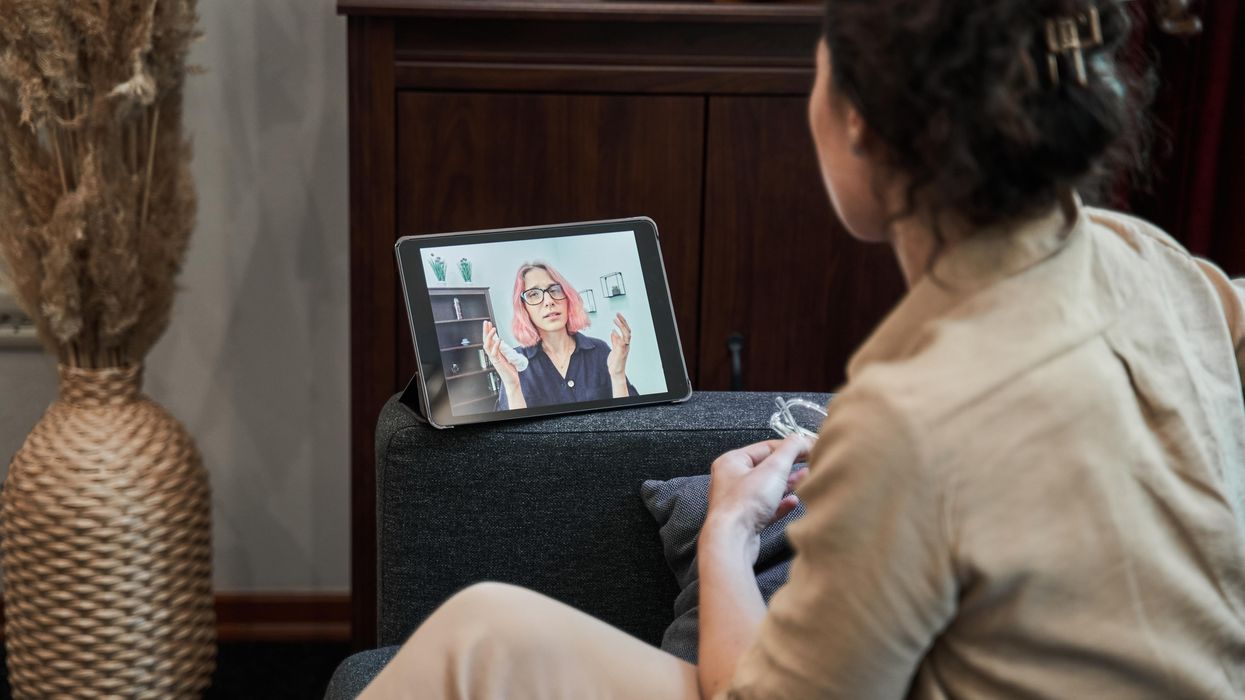Even when we do try new methodologies, we often don’t do so effectively, because we cling to the same approaches that worked in previous situations. Scientists call this behavior functional fixedness. It’s kind of like the saying about the hammer-nail syndrome: “when you have a hammer, everything looks like a nail.”
These two mental blindspots, the status quo bias and functional fixedness, impact decision making in many areas of life. Fortunately, recent research has shown effective and pragmatic strategies to defeat these dangerous errors in judgment. The nine tips below will help you make the best decisions to get effective online therapy, based on the latest research.
Trust the science of online therapy
Extensive research shows that, for most patients, online therapy offers the same benefits as in-person therapy.
For instance, a 2014 study in the Journal of Affective Disorders reported that online treatment proved just as effective as face-to-face treatment for depression. A 2018 study, published in Journal of Psychological Disorders, found that online cognitive behavioral therapy, or CBT, was just as effective as face-to-face treatment for major depression, panic disorder, social anxiety disorder, and generalized anxiety disorder. And a 2014 study in Behaviour Research and Therapy discovered that online CBT proved effective in treating anxiety disorders, and helped lower costs of treatment.
During the forced teletherapy of COVID, therapists worried that those with serious mental health conditions would be less likely to convert to teletherapy. Yet research published in Counselling Psychology Quarterly has helped to alleviate that concern. It found that those with schizophrenia, bipolar disorder, severe depression, PTSD, and even suicidality converted to teletherapy at about the same rate as those with less severe mental health challenges.
Yet teletherapy may not be for everyone. For example, adolescents had the most varied response to teletherapy, according to a 2020 study in Family Process. Some adapted quickly and easily, while others found it awkward and anxiety-inducing. On the whole, children with trauma respond worse to online therapy, per a 2020 study in Child Abuse & Neglect. The treatment of mental health issues can sometimes require in-person interactions, such as the use of eye movement desensitization and reprocessing to treat post-traumatic stress disorder. And according to a 2020 study from the Journal of Humanistic Psychology, online therapy may not be as effective for those suffering from loneliness.
Leverage the strengths of online therapy
Online therapy is much more accessible than in-person therapy for those with a decent internet connection, webcam, mic, and digital skills. You don’t have to commute to your therapist’s office, wasting money and time. You can take much less medical leave from work, saving you money and hassle with your boss. If you live in a sparsely populated area, online therapy could allow you to access many specialized kinds of therapy that isn’t accessible locally.
Online options are much quicker compared to the long waiting lines for in-person therapy. You also have much more convenient scheduling options. And you won’t have to worry about running into someone you know in the waiting room. Online therapy is easier to conceal from others and reduces stigma. Many patients may feel more comfortable and open to sharing in the privacy and comfort of their own home.
You can use a variety of communication tools suited to your needs at any given time. Video can be used to start a relationship with a therapist and have more intense and nuanced discussions, but can be draining, especially for those with social anxiety. Voice-only may work well for less intense discussions. Email offers a useful option for long-form, well-thought-out messages. Texting is useful for quick, real-time questions, answers, and reinforcement.
Plus, online therapy is often cheaper than in-person therapy. In the midst of COVID, many insurance providers have decided to cover online therapy.
Address the weaknesses
One weakness is the requirement for appropriate technology and skills to engage in online therapy. Another is the difficulty of forming a close therapeutic relationship with your therapist. You won’t be able to communicate non-verbals as fully and the therapist will not be able to read you as well, requiring you to be more deliberate in how you express yourself.
Another important issue is that online therapy is subject to less government oversight compared to the in-person approach, which is regulated in each state, providing a baseline of quality control. As a result, you have to do more research on the providers that offer online therapy to make sure they’re reputable, use only licensed therapists, and have a clear and transparent pay structure.
Be intentional about advocating for yourself
Figure out what kind of goals you want to achieve. Consider how, within the context of your goals, you can leverage the benefits of online therapy while addressing the weaknesses. Write down and commit to achieving your goals. Remember, you need to be your own advocate, especially in the less regulated space of online therapy, so focus on being proactive in achieving your goals.
Develop your Hero’s Journey
Because online therapy can occur at various times of day through videos calls, emails and text, it might feel more open-ended and less organized, which can have advantages and disadvantages. One way you can give it more structure is to ground these interactions in the story of your self-improvement. Our minds perceive the world through narratives. Create a story of how you’ll get from where you are to where you want to go, meaning your goals.
A good template to use is the Hero’s Journey. Start the narrative with where you are, and what caused you to seek therapy. Write about the obstacles you will need to overcome, and the kind of help from a therapist that you’ll need in the process. Then, describe the final end state: how will you be better off after this journey, including what you will have learned.
Especially in online therapy, you need to be on top of things. Too many people let the therapist manage the treatment plan. As you pursue your hero’s journey, another way to organize for success is to take notes on your progress, and reevaluate how you’re doing every month with your therapist.
Identify your ideal mentor
Since it’s more difficult to be confident about the quality of service providers in an online setting, you should identify in advance the traits of your desired therapist. Every Hero’s Journey involves a mentor figure who guides the protagonist through this journey. So who’s your ideal mentor? Write out their top 10 characteristics, from most to least important.
For example, you might want someone who is:
- Empathetic
- Caring
- Good listener
- Logical
- Direct
- Questioning
- Non-judgmental
- Organized
- Curious
- Flexible
That’s my list. Depending on what challenge you’re facing and your personality and preferences, you should make your own. Then, when you are matched with a therapist, evaluate how well they fit your ideal list.
Fail fast
When you first match with a therapist, try to fail fast. That means, instead of focusing on getting treatment, focus on figuring out if the therapist is a good match based on the traits you identified above. That will enable you to move on quickly if they’re not, and it’s very much worth it to figure that out early.
Tell them your goals, your story, and your vision of your ideal mentor. Ask them whether they think they are a match, and what kind of a treatment plan they would suggest based on the information you provided. And observe them yourself in your initial interactions, focusing on whether they’re a good match. Often, you’ll find that your initial vision of your ideal mentor is incomplete, and you’ll learn through doing therapy what kind of a therapist is the best fit for you.
Choose a small but meaningful subgoal to work on first
This small subgoal should be sufficient to be meaningful and impactful for improving your mental health, but not a big stretch for you to achieve. This subgoal should be a tool for you to use to evaluate whether the therapist is indeed a good fit for you. It will also help you evaluate whether the treatment plan makes sense, or whether it needs to be revised.
Know when to wrap things up
As you approach the end of your planned work and you see you’re reaching your goals, talk to the therapist about how to wrap up rather than letting things drag on for too long. You don’t want to become dependent on therapy: it’s meant to be a temporary intervention. Some less scrupulous therapists will insist that therapy should never end and we should all stay in therapy forever, and you want to avoid falling for this line. When you reach your goals, end your therapy, unless you discover a serious new reason to continue it. Still, it may be wise to set up occasional check-ins once every three to six months to make sure you’re staying on the right track.








